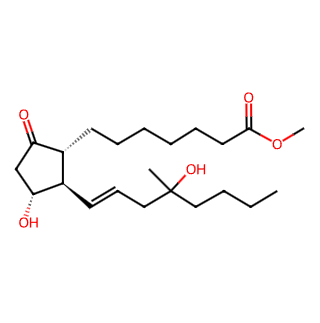- Synthetic anti-infective drugs
- Medications for the digestive system
- Antipyretic and analgesic drugs
- Medications for the blood system
- Medications for the respiratory system
- Anti-allergic drugs
- Medications for the urinary system
- Diagnostic medications
- Immunosuppressive and immunomodulatory drugs
- Vitamins and mineral supplements
- Antioxidants and medications for osteoporosis
- Antiparasitic drugs
- Ophthalmic medications
- Amino acids and their derivatives
- Dermatological medications
- Medications for the circulatory system
- Antitumor drugs
- Medications for the nervous system
- Hormonal and endocrine function-regulating drugs
- Antibiotics
- Others
CAS No.: 59122-46-2




Misoprostol
Misoprostol is a synthetic prostaglandin E1 analog with multiple pharmacological effects and clinical applications.
I. Basic Information
English Name: Misoprostol
Molecular Formula: C22H38O5
Molecular Weight: 382.54
CAS Registry Number: 59122-46-2
II. Pharmacological Effects
Inhibition of Gastric Acid Secretion: Misoprostol significantly inhibits gastric acid secretion by affecting the activity of adenylate cyclase, reducing cAMP levels in parietal cells, thereby inhibiting basal gastric acid secretion and acid secretion induced by pentagastrin, food, histamine, caffeine, etc.
Protection of Gastric Mucosa: It stimulates gastric mucus secretion, increases bicarbonate secretion, promotes phospholipid formation, and enhances gastric mucosal blood flow, thereby strengthening the mucosal barrier and providing direct protection to the gastric mucosa.
Other Effects: Misoprostol also exhibits anti-inflammatory, anti-allergic, cervical softening, and analgesic properties.
III. Clinical Applications
Treatment of Peptic Ulcers: Misoprostol was initially used to treat peptic ulcers, particularly those caused by nonsteroidal anti-inflammatory drugs (NSAIDs). It also offers protection against acute stress-induced ulcers.
Prevention of Postpartum Hemorrhage: Misoprostol is used to prevent postpartum hemorrhage, especially after cesarean section.
Obstetrics and Gynecology Procedures: In obstetrics and gynecology, Misoprostol is commonly used for drug-induced abortion, cervical dilation before painless artificial abortion, and other medical procedures.
Combination Therapy: Misoprostol is often combined with mifepristone for the termination of early pregnancy, achieving high success rates with few side effects.

Tai Yau Street, San Po Kong, Kowloon, Hong Kong, China.



